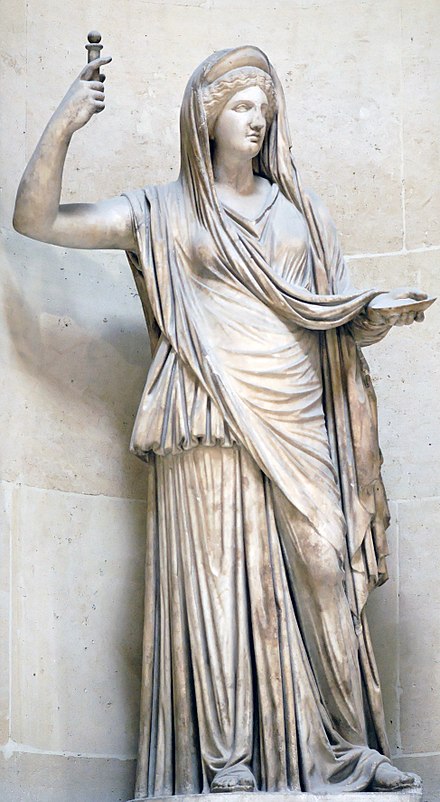Hera

The Campana Hera, a Roman copy of a Hellenistic original, from the Louvre.
Hera, the daughter of Kronos, the sister and also wife of Zeus, was the Greek goddess of marriage, childbirth, and manustruation. In the Iliad she sides with the Greeks and hates Trojans because Paris awarded the Golden Apple of Discord to Aphrodite. She is the mother of Hephaestus, the god of fire, and Ares, the od of war, of Eileithyia, Hecate, and Hebe. Three towns, according to Homer, were especially dear to her – Argos, Sparta, and Mycenae. She is reprsented by the poet as jealous and ill-tempered. As the goddess of lawful marriage she persecutes the illegitimate offspring of her consort Zeus, such as Heracles and Dionysus. She conspires against Zeus, who responds by hanging her up from heaven with golden fetters on her hands and a couple of anvils on her feet. Subsequently she preferred to thwart him secretly rather than defy him openly.
Many interpretations of this figure in mythology have been given in ancient and in modern times: Empedocles and Euripides regarded her as the goddess of the earth; Plato, and after him the Stoics, as the goddess of the clouds. In more recent times she has been regarded as the goddess of the lower air, which is, like Juno in Virgil, varium et mutabile semper, in contrast to Zeus, who is the god of the serene and upper ether. She's also beeninterpreted as a moon-goddess of Greco-Italian times -- a view based on the fact that she resembles all other moon-goddesses in being the goddess of women, and in presiding over menstruation and childbirth; in possessing as her attributes the torch, the bow, and the crown of stars; in the fact that the new moon was the time for her festivals, and finally, on the resemblance between Hera and Juno. As regards the resemblance between these two goddesses, they are each the spouse of the supreme god of the sky, they have the same functions relatively to women, their cult and attributes are similar; and finally, the ancient Epirotic name for Hera was Dione, which corresponds phonetically to Juno.
The ancient identification of Hera with the earth can be dismissed. There is no resemblance between Hera and Gaia, or any other chthonian (earth) deity. Nor can she be regarded as a goddess of the lower air; goddesses of the air are unknown to any related people, and no primitive tribe (or any other tribe than that of mythologists) would distinguish between the lower air and the serene ether. If it is an unalterable canon of mythology that all deities must be nature-myths of some kind, then the interpretation of Hera as a moon-goddess is the most probable. Otherwise we may be content to seek the origin of Hera simply in the necessity under which the worshippers of Zeus lay of providing him with a spouse. And here it becomes a point of some importance to determine at what period Hera was created – whether before the dispersion of the Indo-Europeans or after, and while the joint-ancestors of the Greeks and Italians lived together in a Greco-Italian period, or in purely Greek times. No one claims that Hera dates from before the dispersion of the Indo-Europeans – i.e. from the time when Zeus, though the supreme god, was still to the average Indo-European mind also and always the sky. Nor has the case been made for the Greco-Italian origin of the goddess the fact that Dione in one part of Greece was once the supreme goddess, and was dethroned by Hera, is not enough to prove that Hera was generally, or indeed ever, known as Dione; and, further to say nothing of the fact that Diana rather than Juno is the phonetic equivalent of Dione), there is no identity between the mythological functions of Dione and Juno on the one hand, or of Dione and Hera on the other. As for the resemblances of Hera and Juno, they are not greater than might reasonably be expected: Greeks and Italians, alike inheriting the sky-god (not from a Greco-Italian period, the very existence of which doubtful, but from primitive times), would alike feel the necessity of providing him with a wife; and if in both cases the wife of the supreme god came to be regarded as the goddess of marriage, and of all appertaining to it, the coincidence is not astonishing when we reflect on the considerable similarity between the two peoples.
If then Hera does not date from before purely Greek times, the necessity for interpreting her as a nature-myth is considerably weakened, for as long as Zeus was but the sky we should expect that he could only be married to some nature-power; but when the personality of the god had come to be usually conceived apart from the element from which he originated, we should expect that his consort would be in mythology what she undoubtedly was in art – merely the feminine counterpart of the supreme deity. And, finally, on this view Hera's resemblance to moon-goddesses would be the result of her position as the goddess of marriage, instead of her position as the goddess of marriage being the result of a lunar origin.
